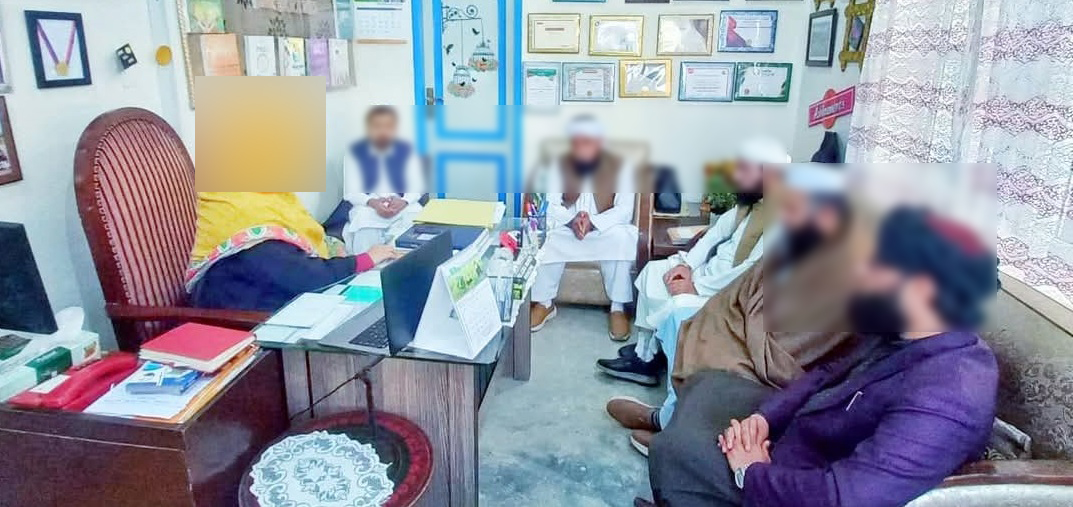By Khalid Khan
In yet another display of unwarranted clerical interference, a delegation of self-proclaimed religious scholars visited a private school in Shabqadar, Charsadda after a video surfaced showing male students dancing at a school event. Instead of standing its ground, the school administration caved under pressure, assuring the clerics that such activities would not be repeated. This incident is yet another reflection of the growing and dangerous trend of Talibanization that is swiftly reaching urban areas, where education is increasingly being dictated by religious hardliners rather than academic professionals.
The fundamental question remains—who granted these clerics the authority to police educational institutions? This is not the first incident or may not be the last one. Recently, religious hardliners went to a college and reprimanded the teacher for teaching the “Theory of Evolution”.
A school event featuring students dancing is neither a crime nor a moral crisis. Yet, a group of self-appointed gatekeepers of morality barged in, issued their decrees and coerced the administration into submission. This blatant interference is not an isolated event but part of a larger, more alarming pattern of clerical overreach in Pakistan’s education system.
These groups possess no legal or constitutional authority over schools, yet they wield influence through fear, intimidation, and the silent complicity of the government. Exploiting religious sentiments, they tighten their grip on institutions that should remain independent and dedicated to fostering learning, critical thinking, and progress.

This trend was systematically designed during General Zia-ul-Haq’s regime when Jamaat-e-Islami was tasked with radicalizing to fuel the Afghan Jihad against the former USSR. As part of this campaign, Jamaat-e-Islami worked to suppress the promotion of fine arts and healthy entertainment in educational institutions, often resorting to violence against students who advocated for progressive and empowered youth. The state fully endorsed these fundamentalist efforts by banning student unions and restructuring the academic syllabus to ensure the ideological indoctrination of society. Instead of detoxifying society in line with its declared stance against terrorism, the state’s double standards and hypocrisy have allowed merchants of faith to hold civil order and fundamental rights hostage.
The most alarming aspect of this recent episode is not merely the interference of religious figures but the spineless response of the school administration and society at large. Rather than defending their students and upholding their right to self-expression, the administration apologized and vowed to prevent similar ‘incidents’ in the future.
This raises serious concerns about the increasing radicalization of Pakistani society. Schools—meant to be centers of knowledge, creativity, and independent thought—are now being forced to bow to external religious pressures, turning them into breeding grounds for regressive ideologies. Moral policing and the imposition of ultra-conservative ideals only push Pakistan further into the abyss of extremism.
Even more concerning is the glaring absence of the state. The pressing question that emerges from this saga is why the government continues to be a silent spectator. Its failure to regulate and protect educational institutions from external interference is actively fueling the radicalization of society. By allowing clerics to dictate the policies of schools, the state is effectively endorsing their authority over education and public life. This is not just a localized issue—it is part of a broader pattern of Talibanization that has been creeping into Pakistani society for decades.
The government must take a firm stand. Schools should be safeguarded against such unwarranted interventions. If clerics wish to enforce their version of morality, they should do so within their circles—not in institutions of learning.
This is not about religion; it is about power. The increasing dominance of clerics over educational spaces is a calculated attempt to control minds and shape future generations according to their ideology. If this trend is not halted, Pakistan will continue its descent into a state where education is subordinated to dogma, where critical thinking is sacrificed at the altar of blind obedience, and where progress is crushed under the weight of imposed morality.
It is time for schools to stop apologizing. It is time for society to stop submitting. It is time for the government to stop enabling clerical overreach—Pakistan’s future depends on it.
Disclaimer:
The views and opinions expressed in this article/Opinion/Comment are those of the author and do not necessarily reflect the official policy or position of the DND Thought Center and Dispatch News Desk (DND). Assumptions made within the analysis are not reflective of the position of the DND Thought Center and Dispatch News Desk News.
